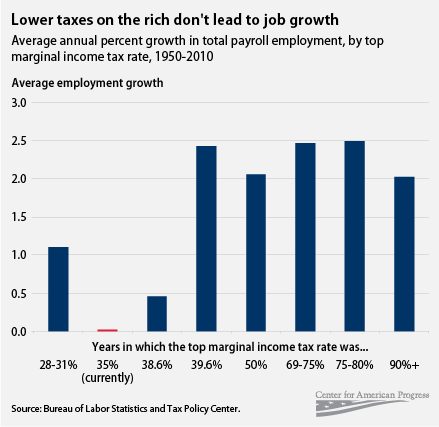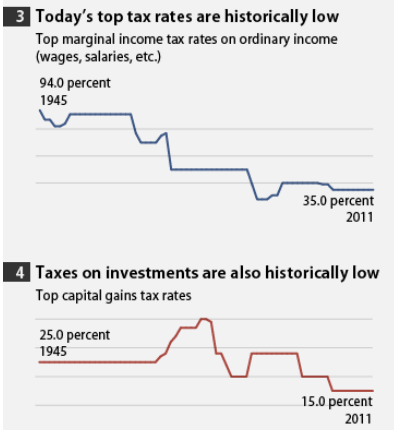
President Obama is planning to call on Congress today to extend the Bush tax cuts for another year, but only for those making less than $250,000. The Bush tax cut package is scheduled to expire at the end of the year, and of course, Republicans have said that they are only interested in extending all of the cuts, including those for the wealthy. That would mean spending billions of dollars on cuts where more than half of the benefit accrues to the richest 5 percent of households.
The administration, however, claims that it will oppose any extension that does not include the $250,000 cut-off. Obama adviser Robert Gibbs insisted yesterday that Obama is “100 percent committed” to ending the tax breaks for the wealthy.
Republicans, of course, will charge that raising taxes on the rich will inevitably harm economic growth and job creation. However, history has revealed that that’s simply not the case. As this chart shows, annual economic growth has been strongest when the top tax rate was higher than it is today:

Job creation has also been stronger when the top tax rate was higher:

Already, taxes on both the rich and investment income (which for the last few decades has been taxed at a lower rate than wage income) are at historic lows, but they didn’t lead to the job creation that was promised by the Bush administration:

So Republican claims about tax increases on the rich destroying the economy — which they make every time such a policy is suggested — are just fearmongering, with no evidence backing them up.
Join us in defending the truth before it’s too late
The future of independent journalism is uncertain, and the consequences of losing it are too grave to ignore. To ensure Truthout remains safe, strong, and free, we need to raise $33,000 in the next 2 days. Every dollar raised goes directly toward the costs of producing news you can trust.
Please give what you can — because by supporting us with a tax-deductible donation, you’re not just preserving a source of news, you’re helping to safeguard what’s left of our democracy.